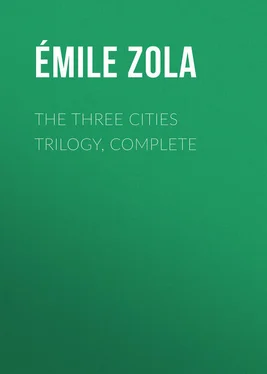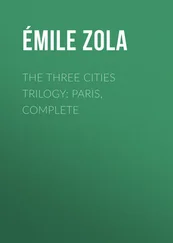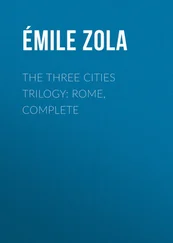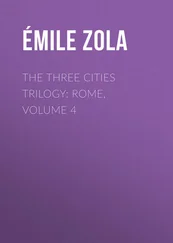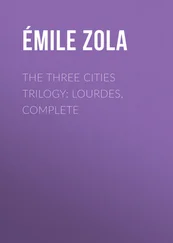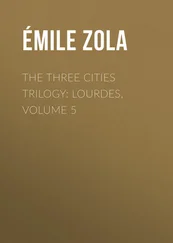Émile Zola - The Three Cities Trilogy, Complete
Здесь есть возможность читать онлайн «Émile Zola - The Three Cities Trilogy, Complete» — ознакомительный отрывок электронной книги совершенно бесплатно, а после прочтения отрывка купить полную версию. В некоторых случаях можно слушать аудио, скачать через торрент в формате fb2 и присутствует краткое содержание. Жанр: literature_19, foreign_antique, foreign_prose, на английском языке. Описание произведения, (предисловие) а так же отзывы посетителей доступны на портале библиотеки ЛибКат.
- Название:The Three Cities Trilogy, Complete
- Автор:
- Жанр:
- Год:неизвестен
- ISBN:нет данных
- Рейтинг книги:5 / 5. Голосов: 1
-
Избранное:Добавить в избранное
- Отзывы:
-
Ваша оценка:
- 100
- 1
- 2
- 3
- 4
- 5
The Three Cities Trilogy, Complete: краткое содержание, описание и аннотация
Предлагаем к чтению аннотацию, описание, краткое содержание или предисловие (зависит от того, что написал сам автор книги «The Three Cities Trilogy, Complete»). Если вы не нашли необходимую информацию о книге — напишите в комментариях, мы постараемся отыскать её.
The Three Cities Trilogy, Complete — читать онлайн ознакомительный отрывок
Ниже представлен текст книги, разбитый по страницам. Система сохранения места последней прочитанной страницы, позволяет с удобством читать онлайн бесплатно книгу «The Three Cities Trilogy, Complete», без необходимости каждый раз заново искать на чём Вы остановились. Поставьте закладку, и сможете в любой момент перейти на страницу, на которой закончили чтение.
Интервал:
Закладка:
But there came an awful pang to his heart – he once more beheld his mother lying dead. This again was a thunderbolt, an illness of scarce three days’ duration, a sudden passing away, as in the case of Madame de Guersaint. One evening, after a wild hunt for the doctor, he had found her motionless and quite white. She had died during his absence; and his lips had ever retained the icy thrill of the last kiss that he had given her. Of everything else – the vigil, the preparations, the funeral – he remembered nothing. All that had become lost in the black night of his stupor and grief, grief so extreme that he had almost died of it – seized with shivering on his return from the cemetery, struck down by a fever which during three weeks had kept him delirious, hovering between life and death. His brother had come and nursed him and had then attended to pecuniary matters, dividing the little inheritance, leaving him the house and a modest income and taking his own share in money. And as soon as Guillaume had found him out of danger he had gone off again, once more vanishing into the unknown. But then through what a long convalescence he, Pierre, had passed, buried as it were in that deserted house. He had done nothing to detain Guillaume, for he realised that there was an abyss between them. At first the solitude had brought him suffering, but afterwards it had grown very pleasant, whether in the deep silence of the rooms which the rare noises of the street did not disturb, or under the screening, shady foliage of the little garden, where he could spend whole days without seeing a soul. His favourite place of refuge, however, was the old laboratory, his father’s cabinet, which his mother for twenty years had kept carefully locked up, as though to immure within it all the incredulity and damnation of the past. And despite the gentleness, the respectful submissiveness which she had shown in former times, she would perhaps have some day ended by destroying all her husband’s books and papers, had not death so suddenly surprised her. Pierre, however, had once more had the windows opened, the writing-table and the bookcase dusted; and, installed in the large leather arm-chair, he now spent delicious hours there, regenerated as it were by his illness, brought back to his youthful days again, deriving a wondrous intellectual delight from the perusal of the books which he came upon.
The only person whom he remembered having received during those two months of slow recovery was Doctor Chassaigne, an old friend of his father, a medical man of real merit, who, with the one ambition of curing disease, modestly confined himself to the role of the practitioner. It was in vain that the doctor had sought to save Madame Froment, but he flattered himself that he had extricated the young priest from grievous danger; and he came to see him from time to time, to chat with him and cheer him, talking with him of his father, the great chemist, of whom he recounted many a charming anecdote, many a particular, still glowing with the flame of ardent friendship. Little by little, amidst the weak languor of convalescence, the son had thus beheld an embodiment of charming simplicity, affection, and good nature rising up before him. It was his father such as he had really been, not the man of stern science whom he had pictured whilst listening to his mother. Certainly she had never taught him aught but respect for that dear memory; but had not her husband been the unbeliever, the man who denied, and made the angels weep, the artisan of impiety who sought to change the world that God had made? And so he had long remained a gloomy vision, a spectre of damnation prowling about the house, whereas now he became the house’s very light, clear and gay, a worker consumed by a longing for truth, who had never desired anything but the love and happiness of all. For his part, Doctor Chassaigne, a Pyrenean by birth, born in a far-off secluded village where folks still believed in sorceresses, inclined rather towards religion, although he had not set his foot inside a church during the forty years he had been living in Paris. However, his conviction was absolute: if there were a heaven somewhere, Michel Froment was assuredly there, and not merely there, but seated upon a throne on the Divinity’s right hand.
Then Pierre, in a few minutes, again lived through the frightful torment which, during two long months, had ravaged him. It was not that he had found controversial works of an anti-religious character in the bookcase, or that his father, whose papers he sorted, had ever gone beyond his technical studies as a savant . But little by little, despite himself, the light of science dawned upon him, an ensemble of proven phenomena, which demolished dogmas and left within him nothing of the things which as a priest he should have believed. It seemed, in fact, as though illness had renewed him, as though he were again beginning to live and learn amidst the physical pleasantness of convalescence, that still subsisting weakness which lent penetrating lucidity to his brain. At the seminary, by the advice of his masters, he had always kept the spirit of inquiry, his thirst for knowledge, in check. Much of that which was taught him there had surprised him; however, he had succeeded in making the sacrifice of his mind required of his piety. But now, all the laboriously raised scaffolding of dogmas was swept away in a revolt of that sovereign mind which clamoured for its rights, and which he could no longer silence. Truth was bubbling up and overflowing in such an irresistible stream that he realised he would never succeed in lodging error in his brain again. It was indeed the total and irreparable ruin of faith. Although he had been able to kill his flesh by renouncing the romance of his youth, although he felt that he had altogether mastered carnal passion, he now knew that it would be impossible for him to make the sacrifice of his intelligence. And he was not mistaken; it was indeed his father again springing to life in the depths of his being, and at last obtaining the mastery in that dual heredity in which, during so many years, his mother had dominated. The upper part of his face, his straight, towering brow, seemed to have risen yet higher, whilst the lower part, the small chin, the affectionate mouth, were becoming less distinct. However, he suffered; at certain twilight hours when his kindliness, his need of love awoke, he felt distracted with grief at no longer believing, distracted with desire to believe again; and it was necessary that the lighted lamp should be brought in, that he should see clearly around him and within him, before he could recover the energy and calmness of reason, the strength of martyrdom, the determination to sacrifice everything to the peace of his conscience.
Then came the crisis. He was a priest and he no longer believed. This had suddenly dawned before him like a bottomless abyss. It was the end of his life, the collapse of everything. What should he do? Did not simple rectitude require that he should throw off the cassock and return to the world? But he had seen some renegade priests and had despised them. A married priest with whom he was acquainted filled him with disgust. All this, no doubt, was but a survival of his long religious training. He retained the notion that a priest cannot, must not, weaken; the idea that when one has dedicated oneself to God one cannot take possession of oneself again. Possibly, also, he felt that he was too plainly branded, too different from other men already, to prove otherwise than awkward and unwelcome among them. Since he had been cut off from them he would remain apart in his grievous pride; And, after days of anguish, days of struggle incessantly renewed, in which his thirst for happiness warred with the energies of his returning health, he took the heroic resolution to remain a priest, and an honest one. He would find the strength necessary for such abnegation. Since he had conquered the flesh, albeit unable to conquer the brain, he felt sure of keeping his vow of chastity, and that would be unshakable; therein lay the pure, upright life which he was absolutely certain of living. What mattered the rest if he alone suffered, if nobody in the world suspected that his heart was reduced to ashes, that nothing remained of his faith, that he was agonising amidst fearful falsehood? His rectitude would prove a firm prop; he would follow his priestly calling like an honest man, without breaking any of the vows he had taken; he would, in due accordance with the rites, discharge his duties as a minister of the Divinity, whom he would praise and glorify at the altar, and distribute as the Bread of Life to the faithful. Who, then, would dare to impute his loss of faith to him as a crime, even if this great misfortune should some day become known? And what more could be asked of him than lifelong devotion to his vow, regard for his ministry, and the practice of every charity without the hope of any future reward? In this wise he ended by calming himself, still upright, still bearing his head erect, with the desolate grandeur of the priest who himself no longer believes, but continues watching over the faith of others. And he certainly was not alone; he felt that he had many brothers, priests with ravaged minds, who had sunk into incredulity, and who yet, like soldiers without a fatherland, remained at the altar, and, despite, everything, found the courage to make the divine illusion shine forth above the kneeling crowds.
Читать дальшеИнтервал:
Закладка:
Похожие книги на «The Three Cities Trilogy, Complete»
Представляем Вашему вниманию похожие книги на «The Three Cities Trilogy, Complete» списком для выбора. Мы отобрали схожую по названию и смыслу литературу в надежде предоставить читателям больше вариантов отыскать новые, интересные, ещё непрочитанные произведения.
Обсуждение, отзывы о книге «The Three Cities Trilogy, Complete» и просто собственные мнения читателей. Оставьте ваши комментарии, напишите, что Вы думаете о произведении, его смысле или главных героях. Укажите что конкретно понравилось, а что нет, и почему Вы так считаете.
